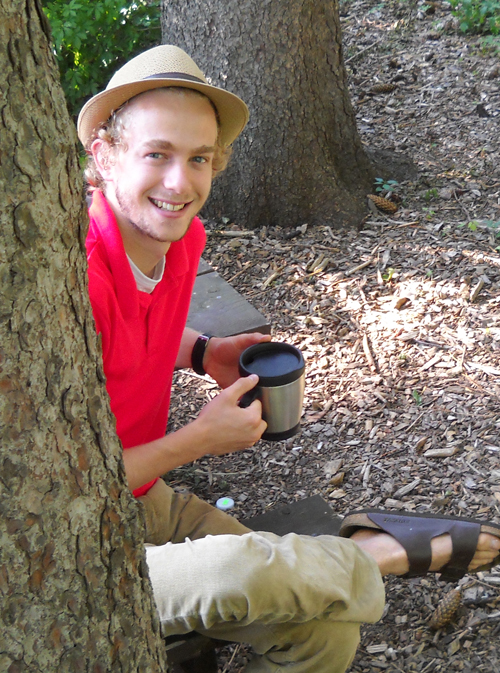On Saturday, Sept. 11, the Guelph Jazz Festival stage in downtown Guelph featured the well-known Ratchet Orchestra and a few younger and less-experienced musicians: a group of Guelph children and youth from KidsAbility.

The KidsAbility musicians are between the ages of 10 and 18 and all have various disabilities, including Down syndrome, cerebral palsy and autism. They’ve all taken part in the jazz improv group that U of G English student Rob Jackson helps to run.
“This is my third summer with this project, and to prepare for the performance, I spend two months working in the KidsAbility program and getting to know the kids,” says Jackson. Based in Guelph’s West End Community Centre, KidsAbility provides a variety of services for children with disabilities and their parents. Jackson is there as part of the University’s Improvisation, Community and Social Practice research project.
He shares what he learns about the children and youth taking part with the professional musicians who will conduct several workshops and ultimately share the stage with the kids. “In the past, we’ve had Larry Kramer, Jane Bunnett, Rich Marsella and Matana Roberts. This year, we’re excited about working with the members of the Ratchet Orchestra.”
Since the musicians generally have little or no experience making music with children of varying abilities, Jackson’s insights about each participant, gathered during his weeks of interaction with them, helps the professionals understand how they can best work together.
The results, he says, are amazing.
“With improvisational music, you don’t have the stress of the structure and rules of a classical music approach. There are fewer ways to be wrong, so the kids can contribute just as much to the music as the professional musicians.”
While the professional musicians use their chosen instruments, such as saxophones and trumpets, the KidsAbility players use simpler ones. Jackson recalls that in the group’s first year, the kids made music with jugs, garbage cans and chimes made from piping. A music store in Kitchener donated slide whistles, shakers, xylophones, balaphones, keyboards, triangles and drums for the kids to play.
Working with children with disabilities is not always easy. “I’ve never had to be so aware of myself, the tone of voice I use and my body language. If I show negativity, the trust I’m building with the kids would be lost. But that kind of awareness can be exhausting ─ I’m so tired at the end of the day.”
For Jackson, of course, this is also a research project. “I videotape the workshops with the musicians and make observational notes,” he explains. “I also tape the performance. After it’s over, I interview the parents, the KidsAbility staff, and the kids themselves to find out what they enjoyed about the experience and what they saw as valuable.”
His goal is to use the feedback he gathers to explore how the improvisational approach could be incorporated into a regular school setting and other community environments to help them be more inclusive.
The research, Jackson says, confirms the value of this opportunity for the kids who take part: “They like to bring their friends and be able to say ‘see, we can do awesome things, too.’”
It’s also been the source of some unexpected revelations for him. “Improvisation shakes up the hierarchy of things. A 10-year-old girl with Down syndrome can sometimes make better improv music than a white male with years of experience. Seeing that has changed how I see the world.”
It’s also changed his perception of education. “Part of this program is having fun and making music in an environment where there are no wrong notes. But the kids are also learning about the instruments, about music and about themselves. Improvisational pedagogy relies on real community between the teacher and the student; learning won’t take place if there are strict roles. You have to take things as they come and be responsive and flexible. That’s when education becomes powerful.”
With this new view of education in mind, Jackson says he’s determined to continue his studies and go on to graduate school. “I want to always be involved in teaching,” he adds.